Analysis of Consumer Behaviour and Trends in Hospitality (Module ABC)
VerifiedAdded on 2023/01/18
|6
|1340
|78
Report
AI Summary
This report provides a comprehensive analysis of consumer behavior and attitudes within the hospitality sector. It begins by investigating various factors influencing consumer decisions, including cultural, social, personal, and psychological aspects, drawing on interview responses from individuals aged 20-60. The report then explores the significant impact of digital technology on consumer trends, focusing on personalization, accessibility of information, and the role of communication and safety. Furthermore, it analyzes the evolving nature of these influencing factors due to globalization and examines emerging trends such as sustainability and digitalized experiences within the industry. Finally, the report critically assesses these trends, highlighting their implications for hospitality businesses and the evolving expectations of consumers. The report concludes by emphasizing the importance of understanding consumer behavior and adapting to the challenges and opportunities presented by current industry trends.
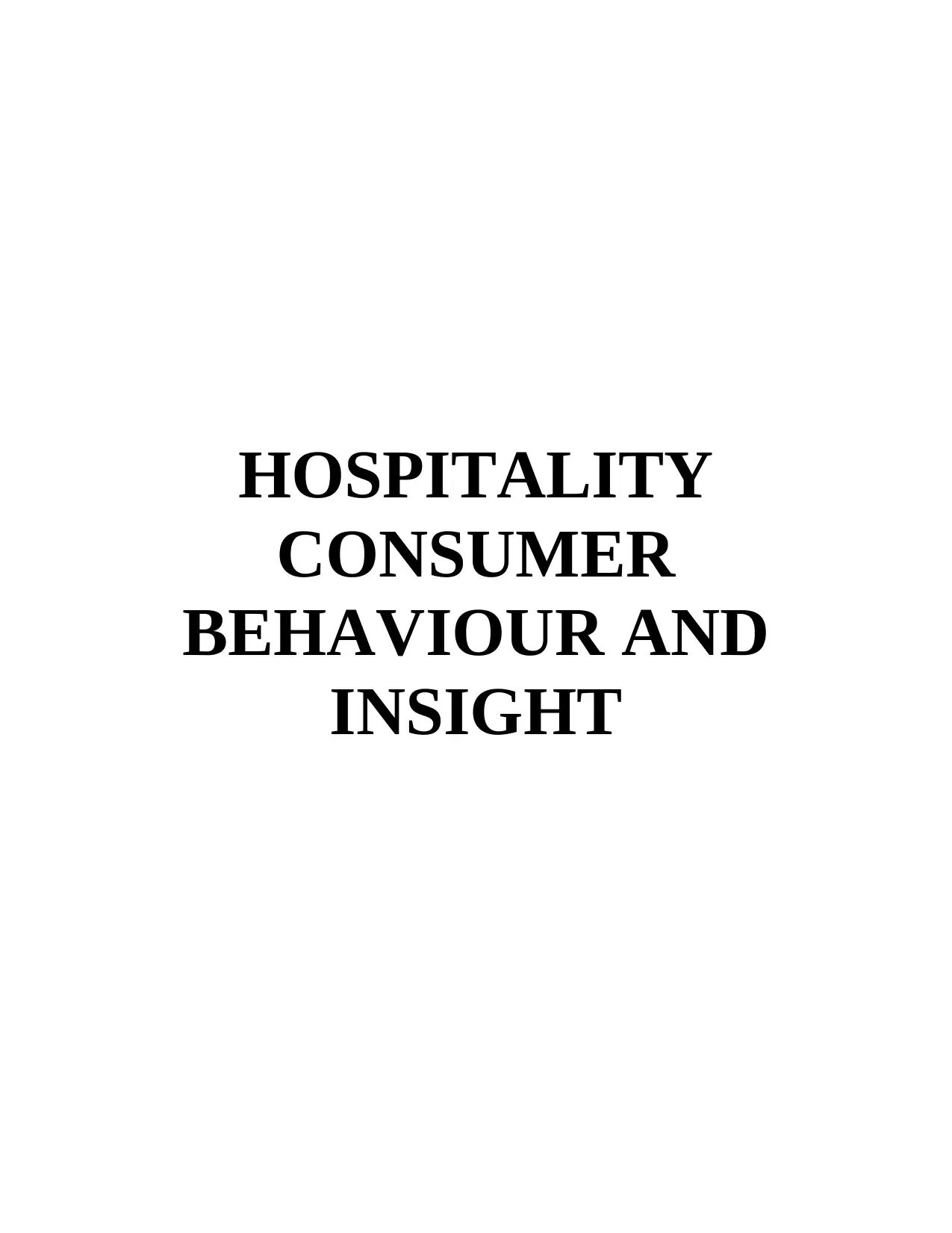
HOSPITALITY
CONSUMER
BEHAVIOUR AND
INSIGHT
CONSUMER
BEHAVIOUR AND
INSIGHT
Paraphrase This Document
Need a fresh take? Get an instant paraphrase of this document with our AI Paraphraser
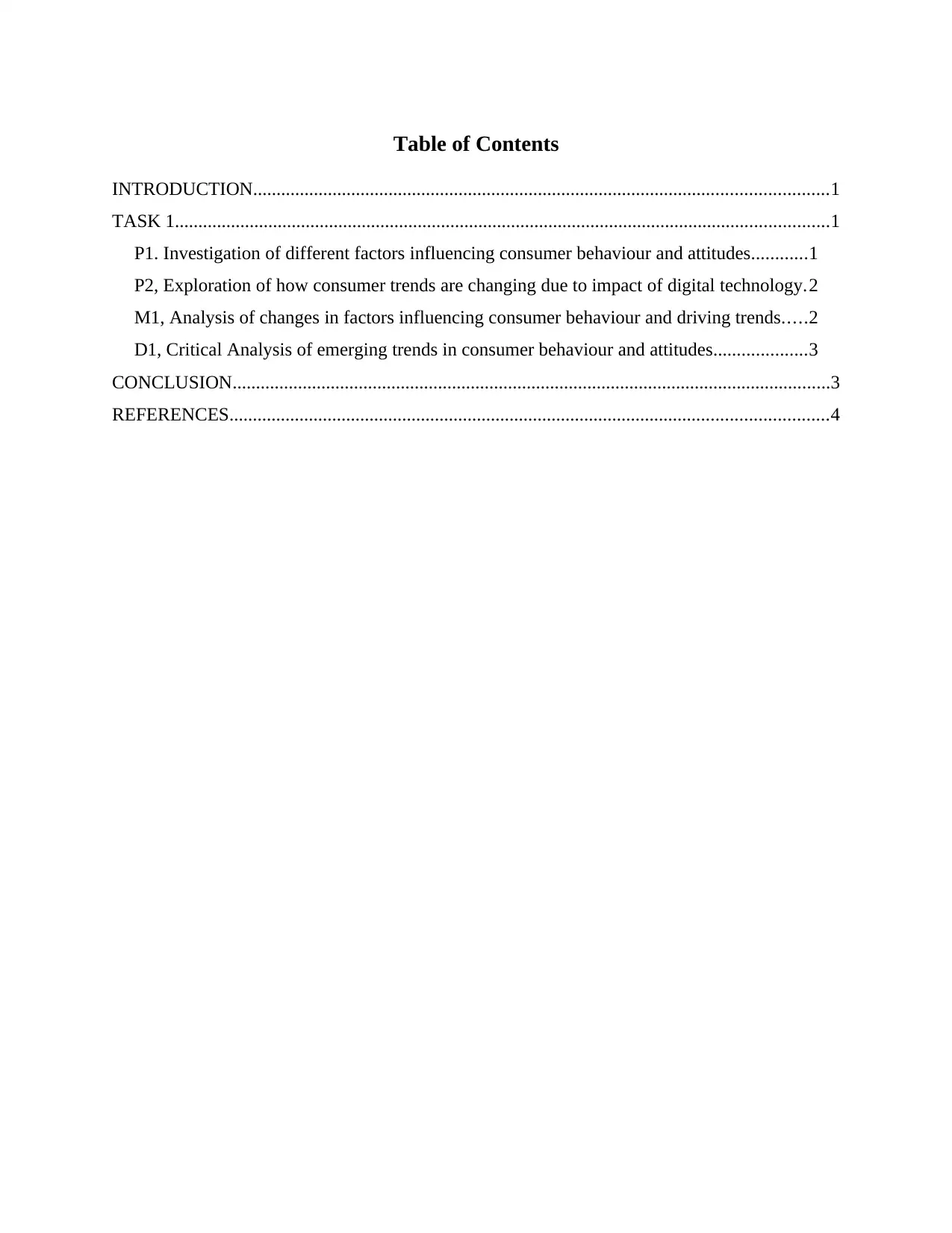
Table of Contents
INTRODUCTION...........................................................................................................................1
TASK 1............................................................................................................................................1
P1. Investigation of different factors influencing consumer behaviour and attitudes............1
P2, Exploration of how consumer trends are changing due to impact of digital technology.2
M1, Analysis of changes in factors influencing consumer behaviour and driving trends.....2
D1, Critical Analysis of emerging trends in consumer behaviour and attitudes....................3
CONCLUSION................................................................................................................................3
REFERENCES................................................................................................................................4
INTRODUCTION...........................................................................................................................1
TASK 1............................................................................................................................................1
P1. Investigation of different factors influencing consumer behaviour and attitudes............1
P2, Exploration of how consumer trends are changing due to impact of digital technology.2
M1, Analysis of changes in factors influencing consumer behaviour and driving trends.....2
D1, Critical Analysis of emerging trends in consumer behaviour and attitudes....................3
CONCLUSION................................................................................................................................3
REFERENCES................................................................................................................................4
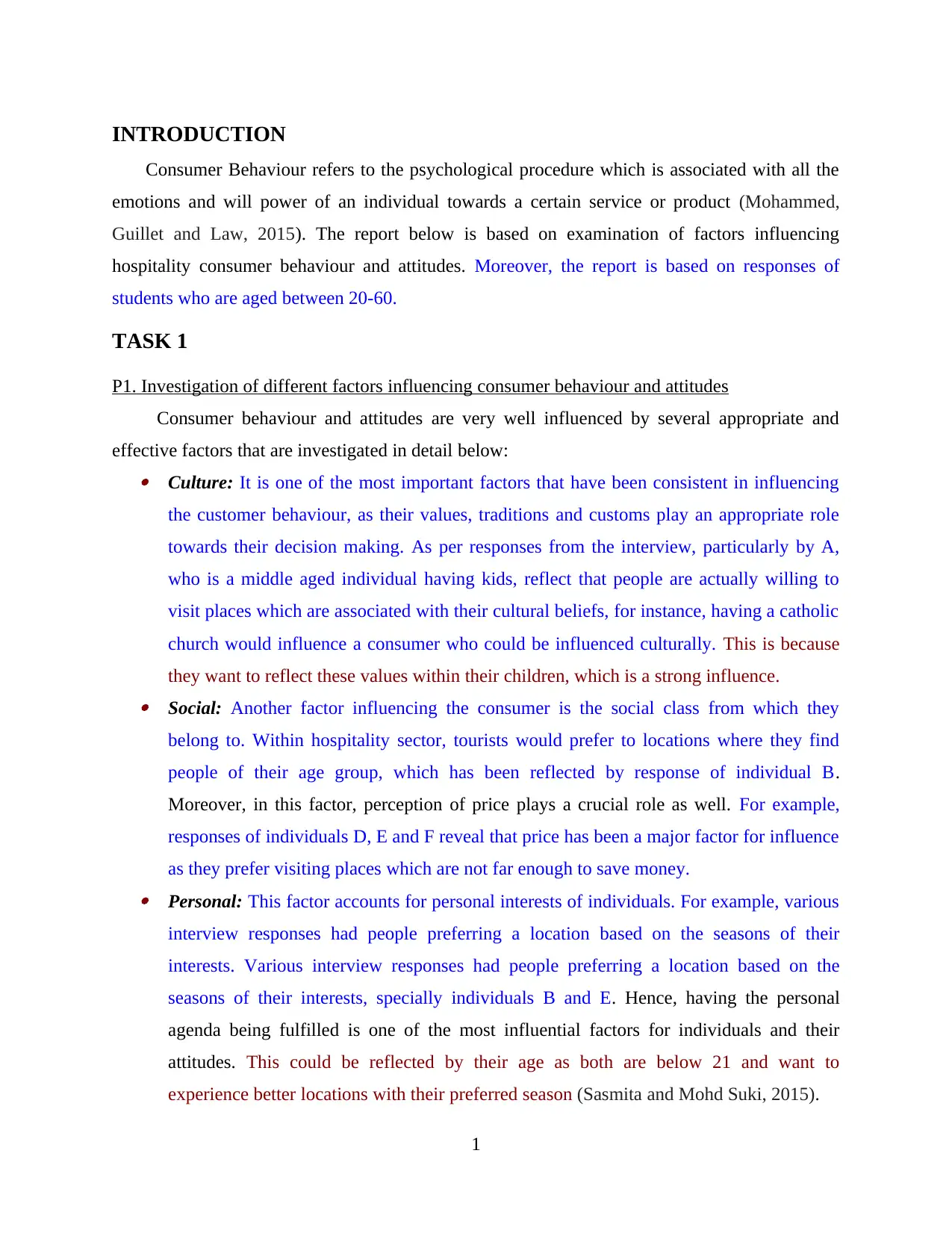
INTRODUCTION
Consumer Behaviour refers to the psychological procedure which is associated with all the
emotions and will power of an individual towards a certain service or product (Mohammed,
Guillet and Law, 2015). The report below is based on examination of factors influencing
hospitality consumer behaviour and attitudes. Moreover, the report is based on responses of
students who are aged between 20-60.
TASK 1
P1. Investigation of different factors influencing consumer behaviour and attitudes
Consumer behaviour and attitudes are very well influenced by several appropriate and
effective factors that are investigated in detail below: Culture: It is one of the most important factors that have been consistent in influencing
the customer behaviour, as their values, traditions and customs play an appropriate role
towards their decision making. As per responses from the interview, particularly by A,
who is a middle aged individual having kids, reflect that people are actually willing to
visit places which are associated with their cultural beliefs, for instance, having a catholic
church would influence a consumer who could be influenced culturally. This is because
they want to reflect these values within their children, which is a strong influence. Social: Another factor influencing the consumer is the social class from which they
belong to. Within hospitality sector, tourists would prefer to locations where they find
people of their age group, which has been reflected by response of individual B.
Moreover, in this factor, perception of price plays a crucial role as well. For example,
responses of individuals D, E and F reveal that price has been a major factor for influence
as they prefer visiting places which are not far enough to save money. Personal: This factor accounts for personal interests of individuals. For example, various
interview responses had people preferring a location based on the seasons of their
interests. Various interview responses had people preferring a location based on the
seasons of their interests, specially individuals B and E. Hence, having the personal
agenda being fulfilled is one of the most influential factors for individuals and their
attitudes. This could be reflected by their age as both are below 21 and want to
experience better locations with their preferred season (Sasmita and Mohd Suki, 2015).
1
Consumer Behaviour refers to the psychological procedure which is associated with all the
emotions and will power of an individual towards a certain service or product (Mohammed,
Guillet and Law, 2015). The report below is based on examination of factors influencing
hospitality consumer behaviour and attitudes. Moreover, the report is based on responses of
students who are aged between 20-60.
TASK 1
P1. Investigation of different factors influencing consumer behaviour and attitudes
Consumer behaviour and attitudes are very well influenced by several appropriate and
effective factors that are investigated in detail below: Culture: It is one of the most important factors that have been consistent in influencing
the customer behaviour, as their values, traditions and customs play an appropriate role
towards their decision making. As per responses from the interview, particularly by A,
who is a middle aged individual having kids, reflect that people are actually willing to
visit places which are associated with their cultural beliefs, for instance, having a catholic
church would influence a consumer who could be influenced culturally. This is because
they want to reflect these values within their children, which is a strong influence. Social: Another factor influencing the consumer is the social class from which they
belong to. Within hospitality sector, tourists would prefer to locations where they find
people of their age group, which has been reflected by response of individual B.
Moreover, in this factor, perception of price plays a crucial role as well. For example,
responses of individuals D, E and F reveal that price has been a major factor for influence
as they prefer visiting places which are not far enough to save money. Personal: This factor accounts for personal interests of individuals. For example, various
interview responses had people preferring a location based on the seasons of their
interests. Various interview responses had people preferring a location based on the
seasons of their interests, specially individuals B and E. Hence, having the personal
agenda being fulfilled is one of the most influential factors for individuals and their
attitudes. This could be reflected by their age as both are below 21 and want to
experience better locations with their preferred season (Sasmita and Mohd Suki, 2015).
1
⊘ This is a preview!⊘
Do you want full access?
Subscribe today to unlock all pages.

Trusted by 1+ million students worldwide
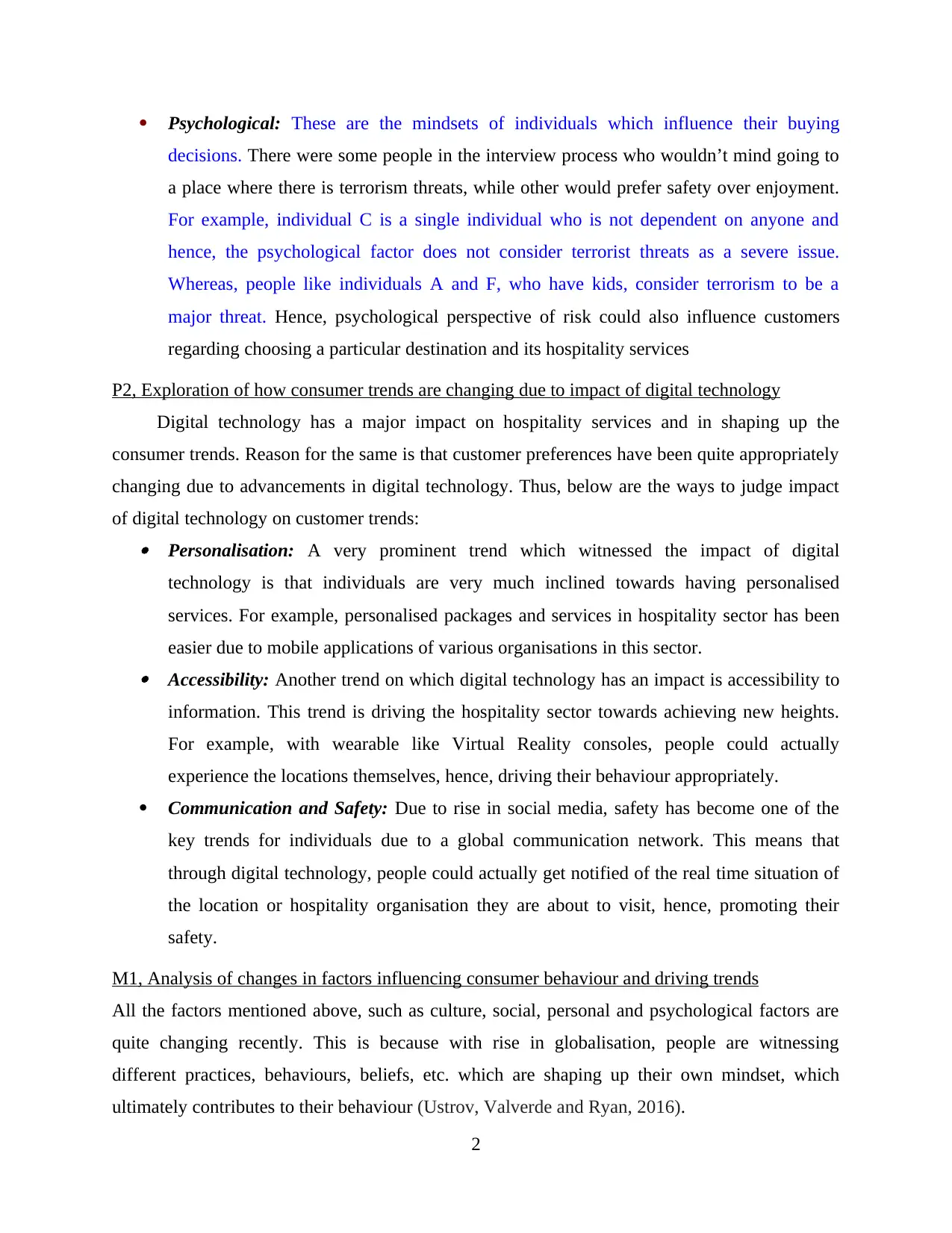
Psychological: These are the mindsets of individuals which influence their buying
decisions. There were some people in the interview process who wouldn’t mind going to
a place where there is terrorism threats, while other would prefer safety over enjoyment.
For example, individual C is a single individual who is not dependent on anyone and
hence, the psychological factor does not consider terrorist threats as a severe issue.
Whereas, people like individuals A and F, who have kids, consider terrorism to be a
major threat. Hence, psychological perspective of risk could also influence customers
regarding choosing a particular destination and its hospitality services
P2, Exploration of how consumer trends are changing due to impact of digital technology
Digital technology has a major impact on hospitality services and in shaping up the
consumer trends. Reason for the same is that customer preferences have been quite appropriately
changing due to advancements in digital technology. Thus, below are the ways to judge impact
of digital technology on customer trends: Personalisation: A very prominent trend which witnessed the impact of digital
technology is that individuals are very much inclined towards having personalised
services. For example, personalised packages and services in hospitality sector has been
easier due to mobile applications of various organisations in this sector. Accessibility: Another trend on which digital technology has an impact is accessibility to
information. This trend is driving the hospitality sector towards achieving new heights.
For example, with wearable like Virtual Reality consoles, people could actually
experience the locations themselves, hence, driving their behaviour appropriately.
Communication and Safety: Due to rise in social media, safety has become one of the
key trends for individuals due to a global communication network. This means that
through digital technology, people could actually get notified of the real time situation of
the location or hospitality organisation they are about to visit, hence, promoting their
safety.
M1, Analysis of changes in factors influencing consumer behaviour and driving trends
All the factors mentioned above, such as culture, social, personal and psychological factors are
quite changing recently. This is because with rise in globalisation, people are witnessing
different practices, behaviours, beliefs, etc. which are shaping up their own mindset, which
ultimately contributes to their behaviour (Ustrov, Valverde and Ryan, 2016).
2
decisions. There were some people in the interview process who wouldn’t mind going to
a place where there is terrorism threats, while other would prefer safety over enjoyment.
For example, individual C is a single individual who is not dependent on anyone and
hence, the psychological factor does not consider terrorist threats as a severe issue.
Whereas, people like individuals A and F, who have kids, consider terrorism to be a
major threat. Hence, psychological perspective of risk could also influence customers
regarding choosing a particular destination and its hospitality services
P2, Exploration of how consumer trends are changing due to impact of digital technology
Digital technology has a major impact on hospitality services and in shaping up the
consumer trends. Reason for the same is that customer preferences have been quite appropriately
changing due to advancements in digital technology. Thus, below are the ways to judge impact
of digital technology on customer trends: Personalisation: A very prominent trend which witnessed the impact of digital
technology is that individuals are very much inclined towards having personalised
services. For example, personalised packages and services in hospitality sector has been
easier due to mobile applications of various organisations in this sector. Accessibility: Another trend on which digital technology has an impact is accessibility to
information. This trend is driving the hospitality sector towards achieving new heights.
For example, with wearable like Virtual Reality consoles, people could actually
experience the locations themselves, hence, driving their behaviour appropriately.
Communication and Safety: Due to rise in social media, safety has become one of the
key trends for individuals due to a global communication network. This means that
through digital technology, people could actually get notified of the real time situation of
the location or hospitality organisation they are about to visit, hence, promoting their
safety.
M1, Analysis of changes in factors influencing consumer behaviour and driving trends
All the factors mentioned above, such as culture, social, personal and psychological factors are
quite changing recently. This is because with rise in globalisation, people are witnessing
different practices, behaviours, beliefs, etc. which are shaping up their own mindset, which
ultimately contributes to their behaviour (Ustrov, Valverde and Ryan, 2016).
2
Paraphrase This Document
Need a fresh take? Get an instant paraphrase of this document with our AI Paraphraser
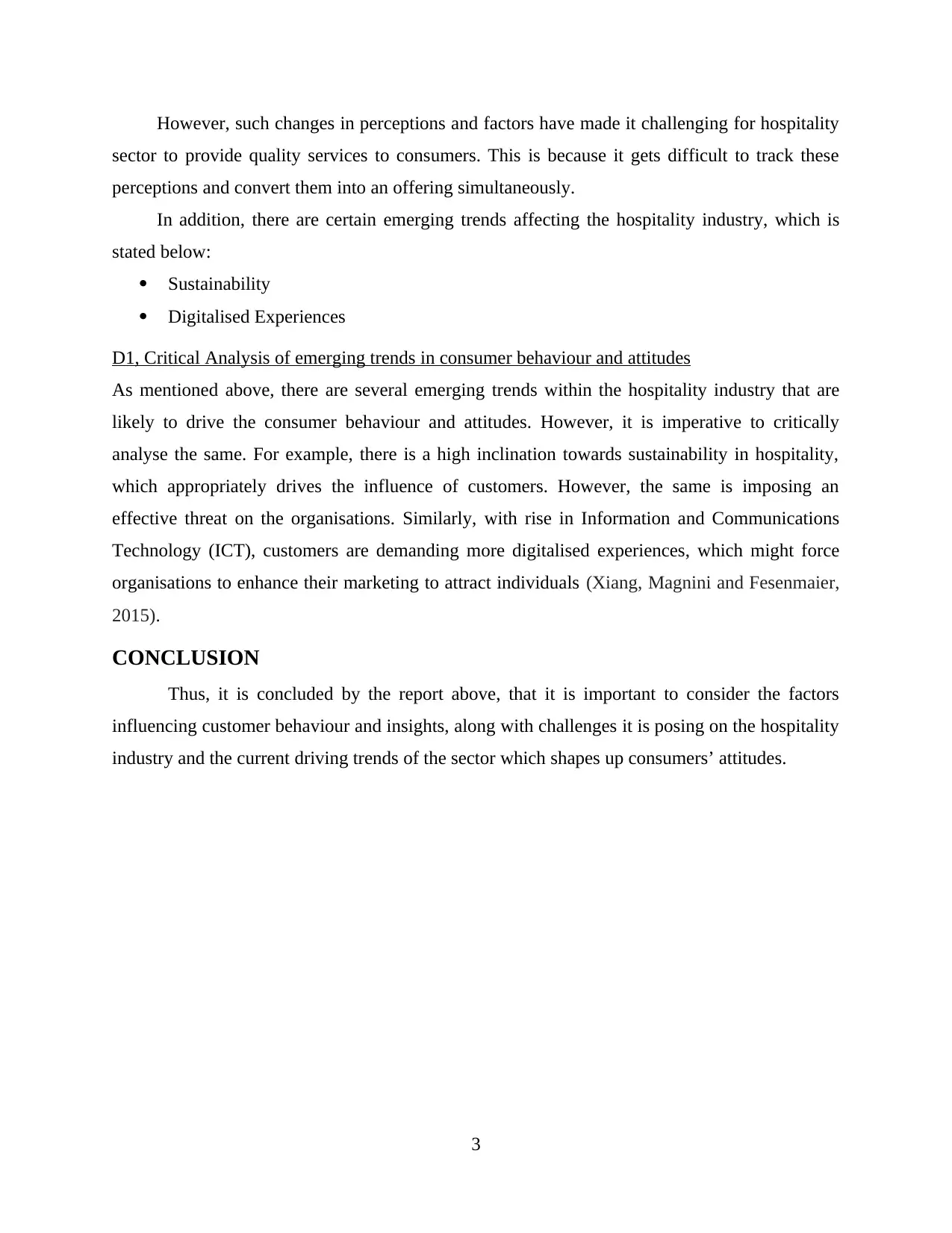
However, such changes in perceptions and factors have made it challenging for hospitality
sector to provide quality services to consumers. This is because it gets difficult to track these
perceptions and convert them into an offering simultaneously.
In addition, there are certain emerging trends affecting the hospitality industry, which is
stated below:
Sustainability
Digitalised Experiences
D1, Critical Analysis of emerging trends in consumer behaviour and attitudes
As mentioned above, there are several emerging trends within the hospitality industry that are
likely to drive the consumer behaviour and attitudes. However, it is imperative to critically
analyse the same. For example, there is a high inclination towards sustainability in hospitality,
which appropriately drives the influence of customers. However, the same is imposing an
effective threat on the organisations. Similarly, with rise in Information and Communications
Technology (ICT), customers are demanding more digitalised experiences, which might force
organisations to enhance their marketing to attract individuals (Xiang, Magnini and Fesenmaier,
2015).
CONCLUSION
Thus, it is concluded by the report above, that it is important to consider the factors
influencing customer behaviour and insights, along with challenges it is posing on the hospitality
industry and the current driving trends of the sector which shapes up consumers’ attitudes.
3
sector to provide quality services to consumers. This is because it gets difficult to track these
perceptions and convert them into an offering simultaneously.
In addition, there are certain emerging trends affecting the hospitality industry, which is
stated below:
Sustainability
Digitalised Experiences
D1, Critical Analysis of emerging trends in consumer behaviour and attitudes
As mentioned above, there are several emerging trends within the hospitality industry that are
likely to drive the consumer behaviour and attitudes. However, it is imperative to critically
analyse the same. For example, there is a high inclination towards sustainability in hospitality,
which appropriately drives the influence of customers. However, the same is imposing an
effective threat on the organisations. Similarly, with rise in Information and Communications
Technology (ICT), customers are demanding more digitalised experiences, which might force
organisations to enhance their marketing to attract individuals (Xiang, Magnini and Fesenmaier,
2015).
CONCLUSION
Thus, it is concluded by the report above, that it is important to consider the factors
influencing customer behaviour and insights, along with challenges it is posing on the hospitality
industry and the current driving trends of the sector which shapes up consumers’ attitudes.
3
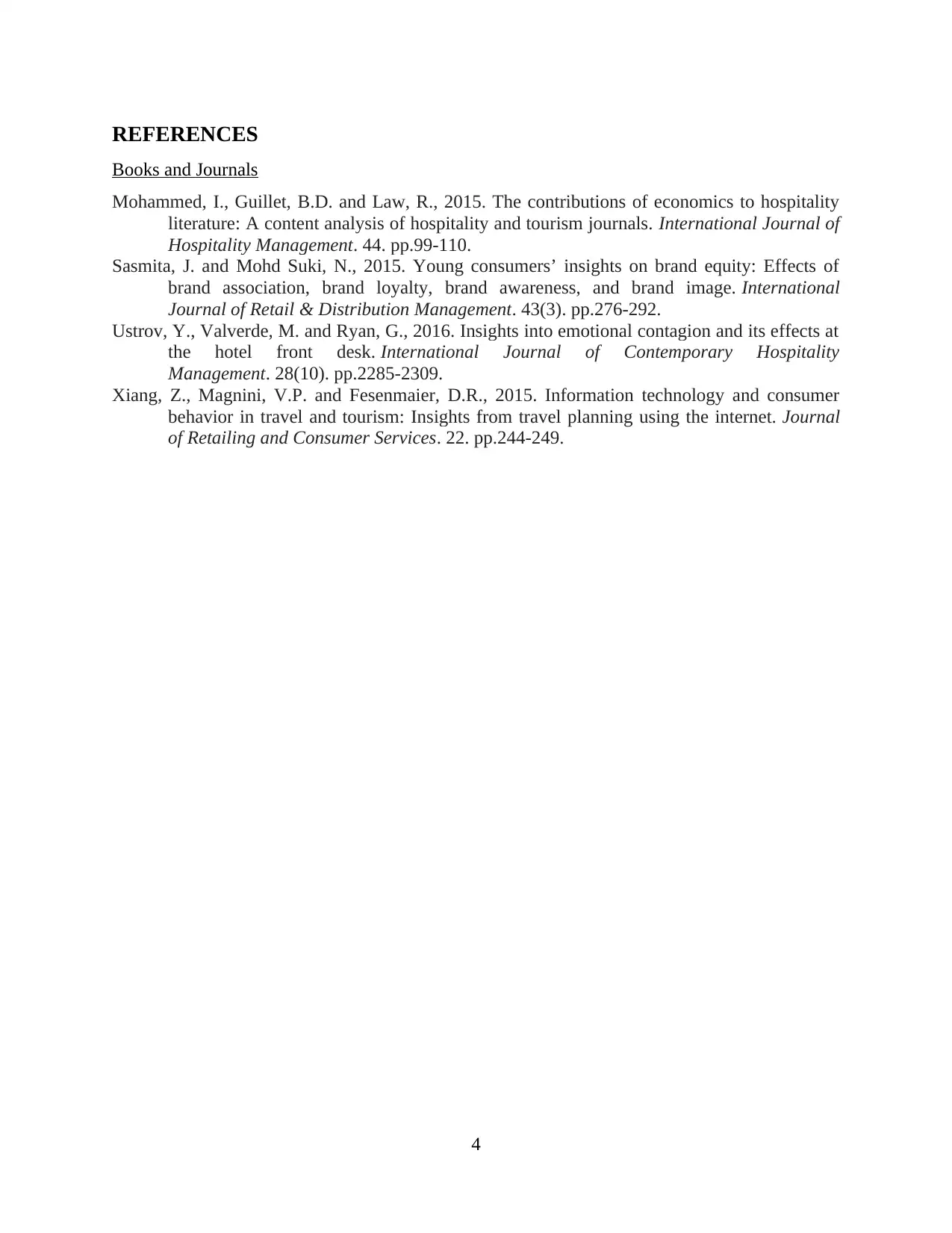
REFERENCES
Books and Journals
Mohammed, I., Guillet, B.D. and Law, R., 2015. The contributions of economics to hospitality
literature: A content analysis of hospitality and tourism journals. International Journal of
Hospitality Management. 44. pp.99-110.
Sasmita, J. and Mohd Suki, N., 2015. Young consumers’ insights on brand equity: Effects of
brand association, brand loyalty, brand awareness, and brand image. International
Journal of Retail & Distribution Management. 43(3). pp.276-292.
Ustrov, Y., Valverde, M. and Ryan, G., 2016. Insights into emotional contagion and its effects at
the hotel front desk. International Journal of Contemporary Hospitality
Management. 28(10). pp.2285-2309.
Xiang, Z., Magnini, V.P. and Fesenmaier, D.R., 2015. Information technology and consumer
behavior in travel and tourism: Insights from travel planning using the internet. Journal
of Retailing and Consumer Services. 22. pp.244-249.
4
Books and Journals
Mohammed, I., Guillet, B.D. and Law, R., 2015. The contributions of economics to hospitality
literature: A content analysis of hospitality and tourism journals. International Journal of
Hospitality Management. 44. pp.99-110.
Sasmita, J. and Mohd Suki, N., 2015. Young consumers’ insights on brand equity: Effects of
brand association, brand loyalty, brand awareness, and brand image. International
Journal of Retail & Distribution Management. 43(3). pp.276-292.
Ustrov, Y., Valverde, M. and Ryan, G., 2016. Insights into emotional contagion and its effects at
the hotel front desk. International Journal of Contemporary Hospitality
Management. 28(10). pp.2285-2309.
Xiang, Z., Magnini, V.P. and Fesenmaier, D.R., 2015. Information technology and consumer
behavior in travel and tourism: Insights from travel planning using the internet. Journal
of Retailing and Consumer Services. 22. pp.244-249.
4
⊘ This is a preview!⊘
Do you want full access?
Subscribe today to unlock all pages.

Trusted by 1+ million students worldwide
1 out of 6
Related Documents
Your All-in-One AI-Powered Toolkit for Academic Success.
+13062052269
info@desklib.com
Available 24*7 on WhatsApp / Email
![[object Object]](/_next/static/media/star-bottom.7253800d.svg)
Unlock your academic potential
Copyright © 2020–2026 A2Z Services. All Rights Reserved. Developed and managed by ZUCOL.



